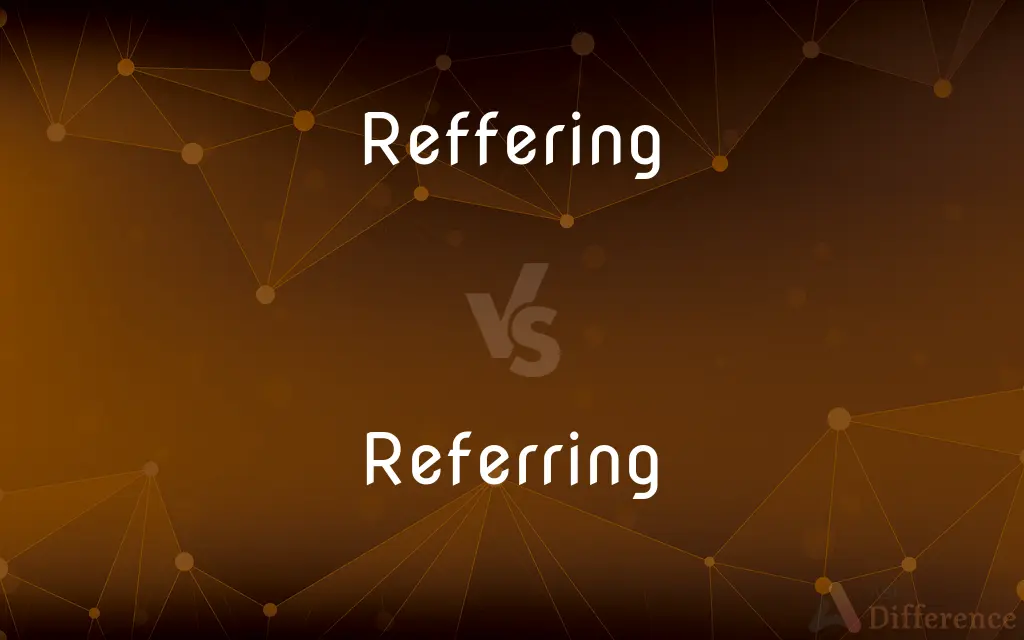Reffering vs. Referring — Which is Correct Spelling?
Edited by Tayyaba Rehman — By Fiza Rafique — Updated on March 31, 2024
"Reffering" is an incorrect spelling. The correct spelling is "referring," which means directing attention or reference to something or someone.

Table of Contents
Which is correct: Reffering or Referring
How to spell Referring?

Reffering
Incorrect Spelling

Referring
Correct Spelling
ADVERTISEMENT
Key Differences
Recall "refer" has one 'r' and when adding "-ing," it becomes double 'r' as in "referring."
When in doubt, always check the base verb "refer."
Think: "reference" also starts with "refer-" just like "referring."
Envision the word "refer" with an addition of "-ing."
Associate with "reference" to remember the "refer-" prefix.
ADVERTISEMENT
How Do You Spell Referring Correctly?
Incorrect: She kept reffering to the wrong document.
Correct: She kept referring to the wrong document.
Incorrect: Why are you reffering to that old article?
Correct: Why are you referring to that old article?
Incorrect: They were reffering to the guide incorrectly.
Correct: They were referring to the guide incorrectly.
Incorrect: Reffering to my notes, I found the answer.
Correct: Referring to my notes, I found the answer.
Incorrect: I was reffering to the manual when I fixed it.
Correct: I was referring to the manual when I fixed it.
Referring Definitions
Assigning for consultation or review.
The doctor is referring me to a specialist.
Directing someone's attention to a source or point of reference.
He was referring to the manual.
Indicating or pointing out.
These symbols are referring to specific data points.
Making mention or reference.
She's always referring to her past adventures.
To direct to a source for help or information
Referred her to a heart specialist.
Referred me to his last employer for a recommendation.
To submit (a matter in dispute) to an authority for arbitration, decision, or examination.
To direct the attention of
I refer you to the training manual.
To assign or attribute to; regard as originated by.
To assign to or regard as belonging within a particular kind or class
Referred the newly discovered partita to the 1600s.
To relate or pertain; concern
Questions referring to yesterday's lecture.
To serve as a descriptor or have as a denotation
The word chair refers to a piece of furniture.
To speak or write about something briefly or incidentally; make reference
Referred during our conversation to several books he was reading.
To turn one's attention, as in seeking information
Refer to a dictionary.
Present participle of refer
The act by which somebody or something is referred; a reference.
Mentioning or alluding to something.
I wasn't referring to you when I made that comment.
Referring Meaning in a Sentence
When referring to the rules, make sure you have the latest version.
She enjoys referring to historical events in her lectures.
While referring to the map, they realized they were going in the wrong direction.
Referring to the instructions, he finally managed to set up the tent.
He was referring to his favorite book during the discussion.
Teachers love referring to classic literature in English classes.
The lawyer kept referring to the law book during the trial.
The coach was referring to a new strategy during the timeout.
By referring to past experiences, he made his point clear.
Referring to her notes, she answered the question correctly.
The scientist is referring to a recent study in her report.
Referring to the schedule will help you know what's next.
Referring to the dictionary helps improve vocabulary.
Referring to the guide, she assembled the furniture easily.
Referring to the contract, she pointed out a discrepancy.
Referring to the recipe made the cooking process easier.
When referring to the manual, I noticed a mistake.
Students were referring to their textbooks during the study group.
The tour guide kept referring to historical facts throughout the tour.
She found the solution by referring to a science journal.
Referring Idioms & Phrases
Referring to the elephant in the room
Talking about an obvious problem or difficult situation that no one wants to talk about.
He finally started referring to the elephant in the room during the family meeting.
Referring to someone behind their back
Talking about someone without their knowledge.
It's not nice to talk about people by referring to them behind their back.
Keep referring to the drawing board
To start over or go back to the planning stage.
After the prototype failed, it was time to keep referring to the drawing board.
Referring to beating around the bush
Avoiding the main topic, not speaking directly about the issue.
Stop referring to beating around the bush and get to the point.
Referring to the rule of thumb
A broadly accurate guide or principle, based on experience or practice rather than theory.
As a rule of thumb, water your plants when the top inch of soil is dry.
Referring to someone's better judgment
Using one's wisdom or logic in making a decision.
She decided to go home early, referring to her better judgment.
Referring to a needle in a haystack
Looking for something that is extremely hard to find.
Finding the original document was like referring to a needle in a haystack.
Referring to someone's strong suit
Talking about a person's particular skill or area of expertise.
Math was never my strong suit, so I avoid referring to it if possible.
Referring to opening a can of worms
To bring up a subject that will cause trouble or is very complicated.
Asking about the old policy was like referring to opening a can of worms.
Referring to the tip of the iceberg
Indicating a much larger, more complex issue or problem than it seems at first.
The minor complaints were just referring to the tip of the iceberg.
Common Curiosities
What is the verb form of referring?
"Refer" is the base verb form.
Why is it called referring?
The term "referring" is derived from "refer," meaning to direct attention or reference, with the "-ing" indicating ongoing action.
What is the plural form of referring?
Referrings, but it's rarely used in this form.
What is the pronunciation of referring?
/rɪˈfɜːrɪŋ/
What is the singular form of referring?
Referring.
Which conjunction is used with referring?
"And" as in "mentioning and referring."
Which vowel is used before referring?
"To" as in "to be referring."
Which preposition is used with referring?
"To" as in "referring to something."
Is referring an adverb?
No.
What is the root word of referring?
The root word is "refer."
Which article is used with referring?
"The" as in "the referring document."
Is referring an abstract noun?
No.
Is referring a collective noun?
No.
Is the referring term a metaphor?
No.
How do we divide referring into syllables?
re-fer-ring.
What part of speech is referring?
Verb (and sometimes noun).
What is another term for referring?
Alluding.
What is the first form of referring?
Refer.
Is referring a vowel or consonant?
"Referring" is a word containing both vowels and consonants.
Is the word referring imperative?
"Refer" can be used in the imperative form, like "Keep referring to the manual!"
How many syllables are in referring?
Three.
What is a stressed syllable in referring?
"fer."
What is the opposite of referring?
Ignoring.
Which determiner is used with referring?
"This" as in "this referring."
Is referring a noun or adjective?
Primarily a verb, but can be used as a noun in contexts like "the referring of patients."
Is referring a countable noun?
When used as a noun, it's uncountable.
What is the second form of referring?
Referred.
How is referring used in a sentence?
"When discussing the matter, she kept referring to her notes to ensure accuracy."
Is referring a negative or positive word?
Neutral.
What is the third form of referring?
Referred.
Share Your Discovery

Previous Comparison
Maried vs. Married
Next Comparison
Honney vs. HoneyAuthor Spotlight
Written by
Fiza RafiqueFiza Rafique is a skilled content writer at AskDifference.com, where she meticulously refines and enhances written pieces. Drawing from her vast editorial expertise, Fiza ensures clarity, accuracy, and precision in every article. Passionate about language, she continually seeks to elevate the quality of content for readers worldwide.
Edited by
Tayyaba RehmanTayyaba Rehman is a distinguished writer, currently serving as a primary contributor to askdifference.com. As a researcher in semantics and etymology, Tayyaba's passion for the complexity of languages and their distinctions has found a perfect home on the platform. Tayyaba delves into the intricacies of language, distinguishing between commonly confused words and phrases, thereby providing clarity for readers worldwide.














































